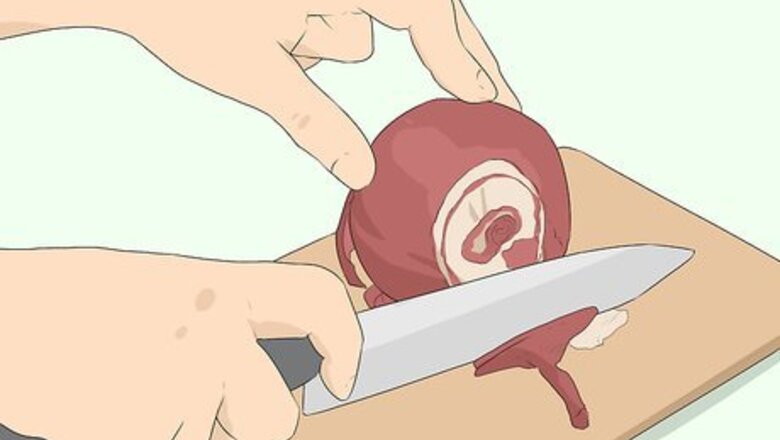
views
X
Research source
Your eyes can also tear up as a result of intense emotion or physical distress. Knowing how to make your eyes water can be useful if you're an actor or simply want the ability to turn on the waterworks whenever you please. If you need to make your eyes water, whatever your reason, you don’t have to cry - you only need some knowhow on your side.
Using Eye Watering Products
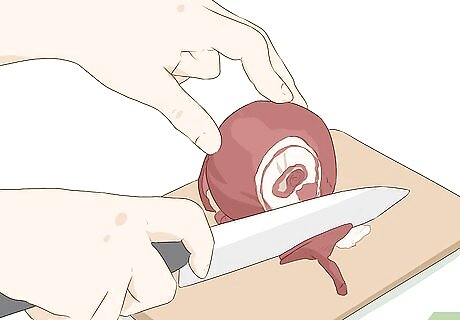
Cut some onions. Onions soak up sulfur from the soil when growing, and when you chop them up, you break open cells in the onion and release enzymes that mix with the sulfur. This creates an invisible gas that causes a burning sensation in your eyes, causing you to tear up without crying. Chop some onions and linger over them. Some people are more sensitive than others; you may only need to cut a little bit of the onion, or you may need to really linger. Cooked onions do not produce this effect. Refrigerated onions and onions doused with water as you cut them will also fail to make your eyes water. Sweet onions, like Vidalia onions, often don’t produce as strong a watering effect in your eyes as stronger white or yellow onions.
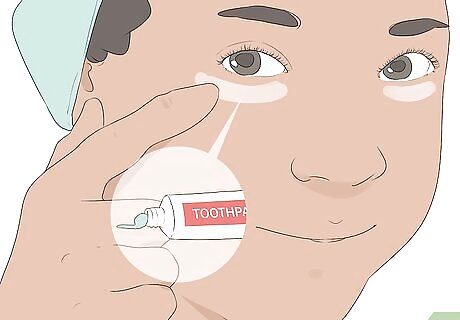
Smear some toothpaste beneath your eyes. You should be careful when doing this; getting toothpaste directly in your eye will sting. However, if you rub a small amount on your lower eyelid, your eyes will try to flush the toothpaste with watering eyes. You may have to wait a few moments before your eyes respond to your application of toothpaste. Most common toothpastes should work for the purposes of making your eyes water as most toothpastes contain sodium lauryl sulfate, a known eye irritant. All natural toothpastes, or toothpastes missing the ingredient sodium lauryl sulfate, may not work as well for making your eyes water.
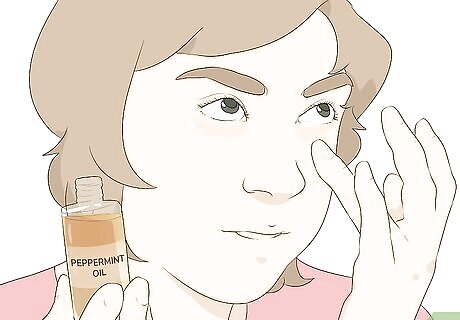
Trigger an eye-watering response with peppermint oil. Products that contain peppermint can cause a stinging sensation in the eyes, resulting in you tearing up. Take a small amount and apply it beneath your eye to create a watering effect. You’ll have to experiment with how much peppermint oil you use. Some individuals will be more sensitive to it than others. Avoid getting the oil in your eyes, as it can create stinging, redness, and discomfort.
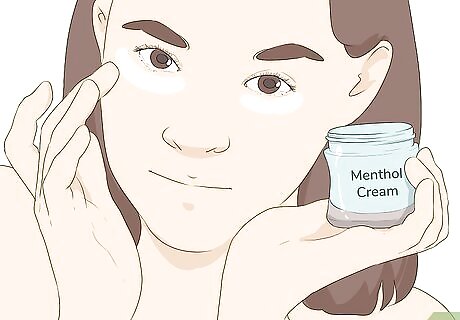
Apply a menthol cream or wax. Menthol, or compounds that contain menthol, are widely available at drug stores and are generally inexpensive. You can dab small amount of menthol cream below your eyes to cause your eyes to tear up. You might also make use of a tear stick, which is much like lip balm infused with menthol and camphor to make you tear up. Simply smear a small amount under each eye, and you should feel its effects.
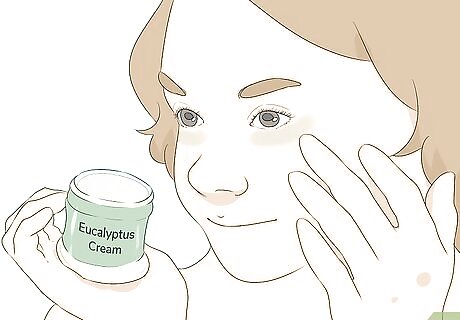
Use eucalyptus to get your eyes watering. The compounds in eucalyptus have an invigorating effect on your body, opening sinuses, refreshing the lungs, and even flushing the eyes. A common stage trick some actors use for watery eyes needed at the beginning of a scene involves other actors blowing eucalyptus vapor gently into their eyes. This might work for you as well!
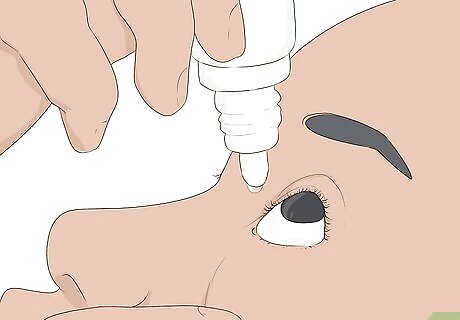
Use eye drops or saline solution. While this technique won’t make your eyes water for very long, it’s a very effective short term measure. If you can disguise the motion of inserting eye drops or saline solution into your eye from onlookers, when you turn back, the excess solution will make it appear as though your eyes are watering. Saline solution is a liquid solution formulated to be about the same as the tears that wet your eye making this a safe and practical way of making your eyes look teary. Saline solution and eye drops can be found at most drug stores.
Using Physical Means
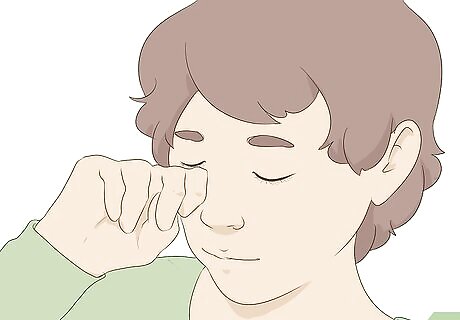
Rub the area beneath your eyes gently. Be sure you don’t overdo this eye-watering technique. Your eye is made up of many delicate parts, and rubbing too hard can cause damage, especially if done over a long period of time. Be aware that this trick sets up a chain reaction that can lead to stinging eyes, creating a bloodshot appearance. You should only do this with clean hands to prevent the introduction of germs into your eyes.
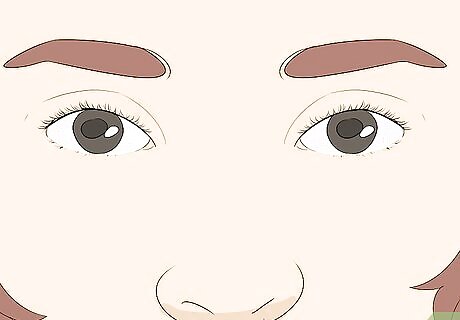
Dry out your eyes by staring. Your eyes’ natural response to dryness is to water to rehydrate and protect each eye. By keeping your eyes open for an extended period of time, your eye will become dry and start to water. You might even turn this into a game with a friend and have a staring contest.
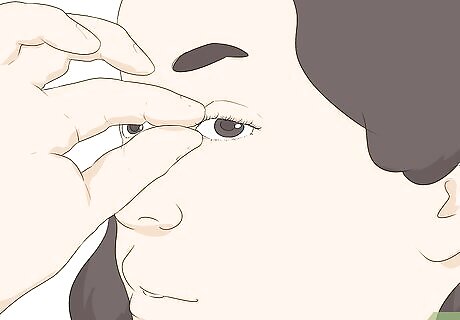
Grasp your upper eyelid and your lower eyelid by the lashes and pull. The stinging sensation caused by pulling on your lashes or pulling out your lashes should make your eyes water nicely. Though you shouldn’t intentionally pull out your lashes, you don’t have to worry if you do. Eyelashes, contrary to common belief, do grow back.
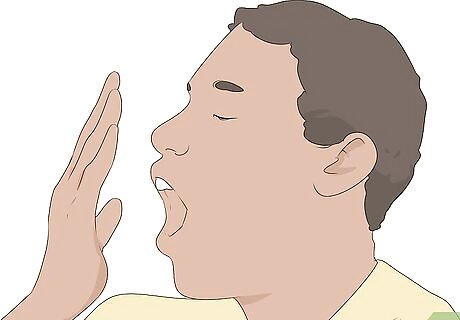
Yawn. When you yawn, the tension of the muscles in your eyes and face cause your tear ducts to close off for its duration. This causes a slight surge of fluid (tears) once you are finished and your yawning muscles relax. If you can make yourself yawn, your eyes should water.
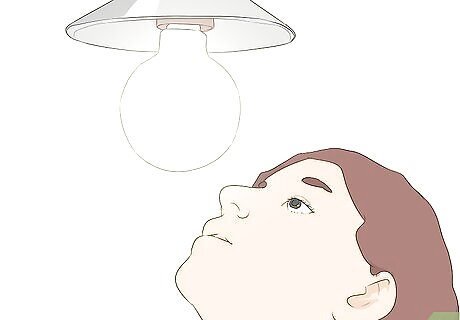
Look into the lights. Though you shouldn’t stare into bright lights for long periods of time, as this can be harmful to your vision, some actors have used bright lights to trigger their eyes water. A famous example of this is actor Henry Fonda, who would often stare into bright lights when he needed to water up on stage.
Using Psychological Techniques

Imagine things you find sad. If your goal is to get your waterworks started, you may have to go over the top in your imagining. Usually, there is at least one thing, like mistreated animals or impoverished children, that you can’t help getting sad over. Use these to water up! Some other ideas that might get you teary-eyed include: War Starvation Disease Death

Use muscle memory to trigger teary eyes. Try to assume the position you were in at a time when you were teary-eyed for some reason. Then, as closely as you are able, mimic the motions, rate of breathing, and noises you made at that time. Though this might seem a little awkward, with practice your body’s muscle memory can be trained to activate your tear glands to water your eyes.
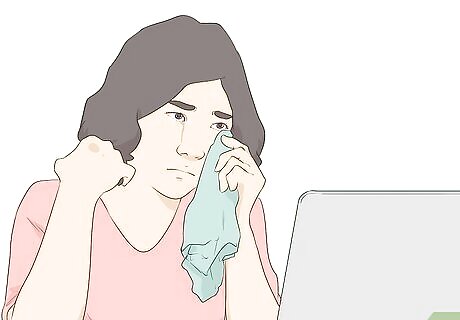
Assume a teary-eyed persona. You don’t have to be an actor to make use of actor’s tricks. By identifying with a character, either an imaginary one or a live-action one you’ve seen on TV, you can make yourself misty eyed. Try to choose a character whose situation you can relate to. Relatable characters will make it easier for you to slip into their mindset, and from there, get the watering response going.

Find your power phrase. Some phrases may have the ability to really upset you. Professional actors and acting teachers refer to this as a “power phrase” due to the fact that it can be used to give you power over your emotions. Simply repeat the phrase to yourself until you feel your eyes begin to moisten. Some examples of power phrases include: ”I’m not good enough.” ”No one will ever love me.” ”I can’t do anything right.” ”Why does everybody leave me?”
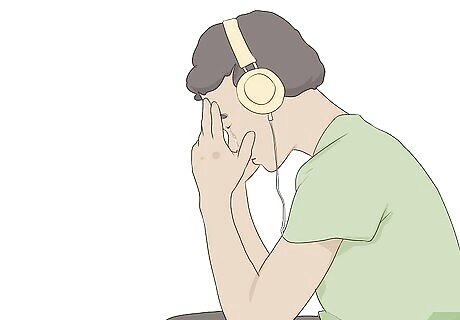
Think about sad music. Music can evoke a powerful emotion response inside of you, both in negative and positive ways. Think of a song that you find particularly depressing, and loop it in your head. You may also want to think about things you find sad or depressing as the music plays in your head. To help yourself get into the mood to cue your eye watering, you might want to bring some headphones and a music player so you can listen to the sad song before you need your eyes to water. When it’s time to water up, take off the headphones and continue playing the song in your head until your tear glands begin to water.










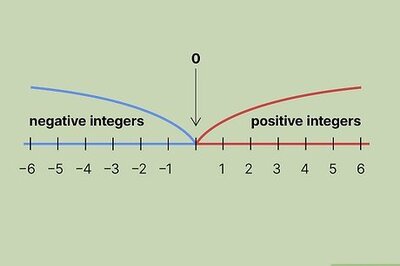








Comments
0 comment